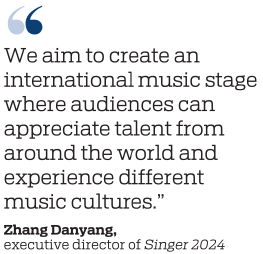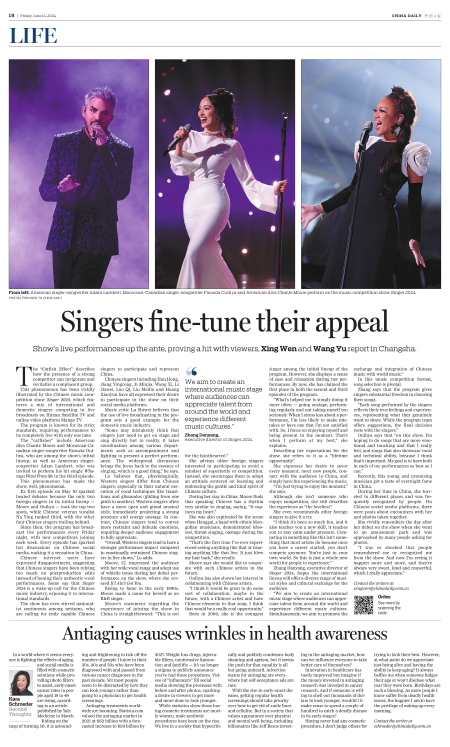
<b>Online</b> See more by scanning the code.


From left: American singer-songwriter Adam Lambert, Moroccan-Canadian singer-songwriter Faouzia Ouihya and American diva Chante Moore perform on the music competition show Singer 2024.
The "Catfish Effect" describes how the presence of a strong competitor can invigorate and revitalize a complacent group. This phenomenon has been vividly illustrated by the Chinese music competition show Singer 2024, which features a mix of international and domestic singers competing in live broadcasts on Hunan Satellite TV and online video platform Mango TV.
The program is known for its strict standards, requiring performances to be completely live with only one take.
The "catfishes" include American diva Chante Moore and Moroccan-Canadian singer-songwriter Faouzia Ouihya, who are among the show's initial lineup, as well as American singer-songwriter Adam Lambert, who was invited to perform his hit single Whataya Want From Me in the third episode.
This phenomenon has made the show, well, phenomenal.
Its first episode on May 10 sparked heated debates because the only two foreign singers in its initial lineup — Moore and Ouihya — took the top two spots, while Chinese veteran vocalist Na Ying ranked third, with the other four Chinese singers trailing behind.
Since then, the program has broadcast live performances every Friday night, with new competitors joining each week. Every episode has sparked hot discussions on Chinese social media, making it a sensation in China.
Chinese internet users have expressed disappointment, suggesting that Chinese singers have been relying too much on postproduction edits instead of honing their authentic vocal performances. Some say that Singer 2024 is a wake-up call for the Chinese music industry, exposing it to international standards.
The show has even stirred nationalist sentiments among netizens, who are calling for truly capable Chinese singers to participate and represent China.
Chinese singers including Han Hong, Jiang Yingrong, Ji Minjia, Wang Xi, Li Jiawei, Luo Qi, Liu Meilin and Huang Xiaoyun have all expressed their desire to participate in the show on their social media platforms.
Music critic Lu Shiwei believes that the use of live broadcasting in the program sets a good example for the domestic music industry.
"Some may mistakenly think that singers just need to get on stage and sing directly but in reality, it takes coordination among various departments such as accompaniment and lighting to present a perfect performance. The widespread discussion brings the focus back to the essence of singing, which is a good thing," he says.
Lu believes that, physiologically, Western singers differ from Chinese singers, especially in their natural execution of vocal techniques like transitions and glissandos (gliding from one pitch to another). Western singers often have a more open and grand musical style, immediately projecting a strong presence and energy onstage. In contrast, Chinese singers tend to convey more restraint and delicate emotions, requiring deeper audience engagement to fully appreciate.
"Overall, Western singers tend to have a stronger performance impact compared to emotionally restrained Chinese singers in live shows," Lu adds.
Moore, 57, impressed the audience with her wide vocal range and adept use of whistle tones during her debut performance on the show, where she covered If I Ain't Got You.
Rising to fame in the early 1990s, Moore made a name for herself as an R&B singer.
Moore's statement regarding the experience of joining the show in China is straightforward: "This is not for the fainthearted."
She advises other foreign singers interested in participating to avoid a mindset of superiority or competition. Instead, she encourages them to adopt an attitude centered on learning and embracing the gentle and kind spirit of Chinese culture.
During her stay in China, Moore finds that speaking Chinese has a rhythm very similar to singing, saying, "It captures my heart."
She was also captivated by the scene when Hanggai, a band with ethnic Mongolian musicians, demonstrated khoomei, throat singing, onstage during the competition.
"That's the first time I've ever experienced seeing anything like that or hearing anything like that live. It just blew my hair back," she recalls.
Moore says she would like to cooperate with such Chinese artists in the future.
Ouihya has also shown her interest in collaborating with Chinese artists.
"I think it would be great to do some sort of collaboration, maybe in the future, with a Chinese artist and have Chinese elements in that song. I think that would be a really cool opportunity."
Born in 2000, she is the youngest singer among the initial lineup of the program. However, she displays a sense of ease and relaxation during her performances. By now, she has claimed the first place in both the second and third episodes of the program.
"What's helped me is simply doing it more often — going onstage, performing regularly and not taking myself too seriously. When I stress less about a performance, I'm less likely to make mistakes or have one that I'm not satisfied with. So, I focus on enjoying myself and being present in the moment. That's when I perform at my best," she explains.
Describing her expectations for the show, she refers to it as a "lifetime opportunity".
She expresses her desire to savor every moment, meet new people, connect with the audience in China, and simply have fun experiencing the music.
"I'm just trying to enjoy the moment," she says.
Although she isn't someone who enjoys competition, she still describes the experience as "the loveliest".
She even recommends other foreign singers to give it a try.
"I think it's been so much fun, and it also teaches you a new skill, it teaches you to stay calm under pressure. Competing in something like this isn't something that most artists do because once you have a career started, you don't compete anymore. You're just in your own world. So this is just a whole new world for people to experience."
Zhang Danyang, executive director of Singer 2024, hopes the international lineup will offer a diverse range of musical styles and cultural exchange for the audience.
"We aim to create an international music stage where audiences can appreciate talent from around the world and experience different music cultures. Simultaneously, we aim to promote the exchange and integration of Chinese music with world music."
In this music competition format, song selection is pivotal.
Zhang says that the program gives singers substantial freedom in choosing their songs.
"Each song performed by the singers reflects their true feelings and experiences, representing what they genuinely want to share. While the program team offers suggestions, the final decision rests with the singers."
Ouihya says that "on this show, I'm hoping to do songs that are more emotional and touching and that I really feel, and songs that also showcase vocal and technical ability, because I think that's important. My goal is to have both in each of my performances as best as I can."
Recently, this young and promising musician got a taste of overnight fame in China.
During her time in China, she traveled to different places and was frequently recognized by people. On Chinese social media platforms, there were posts about encounters with her and photos taken together.
She vividly remembers the day after her debut on the show when she went to an amusement park and was approached by many people asking for photos.
"I was so shocked that people remembered me or recognized me from the show. And now I'm seeing it happen more and more, and they're always very sweet, kind and respectful, which I really appreciate."
Contact the writers at xingwen@chinadaily.com.cn

